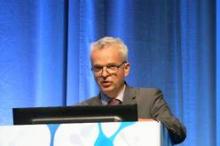VIENNA – Programmed cell death 1 blockade with pembrolizumab proved a good match for nasopharngeal carcinoma, a notoriously difficult-to-treat cancer, in the phase Ib KEYSTONE-028 study.
The objective response rate among 27 heavily pretreated patients with metastatic or recurrent nasopharngeal cancer was 22.2%, including 6 partial responses.
Six patients progressed and 15 had stable disease, bringing the disease control rate to 77.8%, Dr. Chiun Hsu, of National Taiwan University Hospital in Taipei, reported at the European Cancer Congress.
Almost two-thirds of patients (67%) experienced a decrease in target lesions with pembrolizumab (Keytruda). Tumor shrinkage seen in responders at the first assessment.
The median time to response was quite short at 1.8 months, but the responses were quite durable, lasting a median of 10.8 months, he said.
Invited discussant Dr. Ulrich Keilholz, director of the Charité Comprehensive Cancer Center in Berlin, commented, “In those patients with regression, we see quite long-lasting responses. This is very rewarding and interesting.”
There were no late responses after the initial progression or evidence of pseudoprogression, which has been seen with other immunotherapies.
“So the question is really whether we need to keep patients on study if they have progression since we did not see something we saw with ipilimumab (Yervoy) in other diseases, where we had an initial progression and then late response,” he said.
Median progression-free survival was 5.6 months, but ranged from 3.6 months to 11 months, Dr. Hsu said. The PFS rate at 6 months was 49.7% and at 12 months 29%.
“This study is the first demonstration of robust clinical activity of a PD-1 inhibitor in patients with recurrent and metastatic nasopharyngeal carcinoma,” he said.
Recent studies have shown that about a third of patients with nasopharngeal carcinoma will recur after primary treatment and that progression-free survival is typically less than 6 months in recurrent and metastatic disease after failure of platinum-based chemotherapy, Dr. Keilholz observed.
Pembrolizumab has shown clinical activity in more than a dozen tumor types and works by binding to the programmed cell death 1 (PD-1) receptor and blocking its interaction with PD-1 ligand 1 (PD-L1) and 2 (PD-L2). Nasopharyngeal cancer almost universally expresses PD-L1, Dr. Keilholz said.
The 27 patients were drawn from the ongoing, multicohort KEYSTONE-028 study of pembrolizumab in PD-L1-positive advanced solid tumors and received pembrolizumab 10 mg/kg intravenously every two weeks for a maximum of 24 weeks or until disease progression or intolerable toxicity. Their median age was 52 years, 78% were male, 63% Asian, 66.6% had WHO class 2/3 tumors, and 29.6% had received 3 prior lines of therapy for advanced disease.
The safety profile was manageable, Dr. Hsu said. The most common treatment-related adverse event of any grade were pruritus (26%), fatigue (18.5%), and hypothyroidism (18.5%). The most notable grade 3-5 adverse events were two cases each of hepatitis and pneumonitis. There was one treatment-related death due to sepsis and four patients discontinued treatment due to adverse events.
Further investigation of pembrolizumab in this setting is planned, Dr. Hsu said.
On Twitter @pwendl


